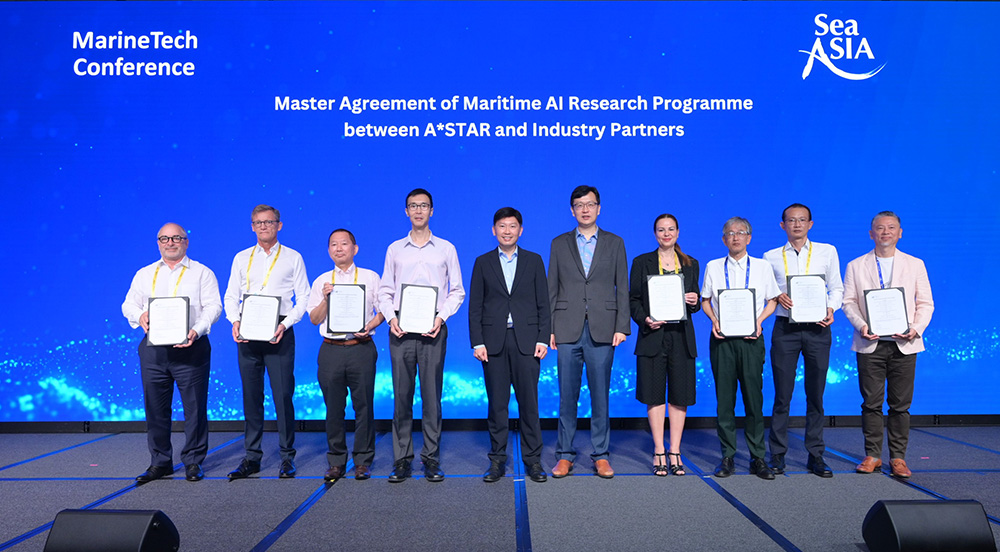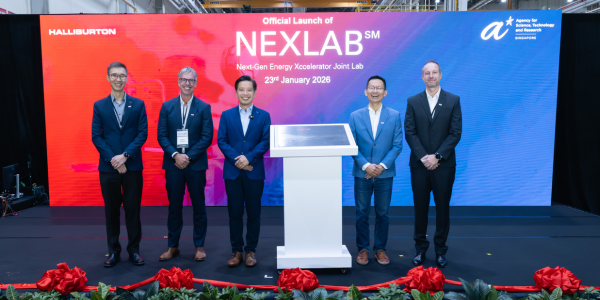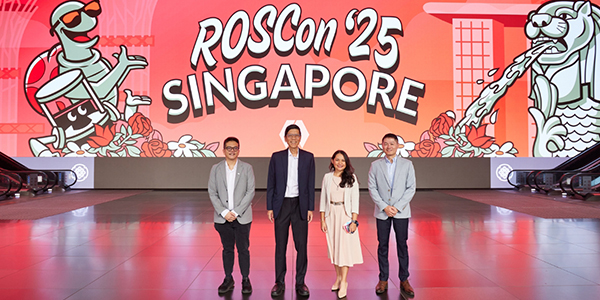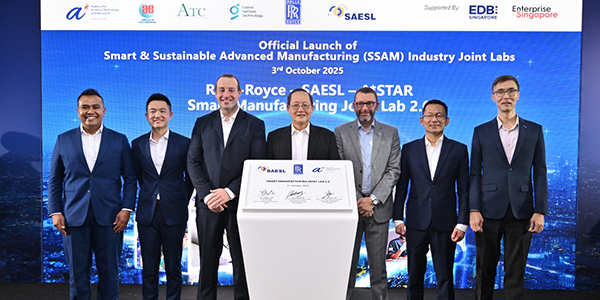A*STAR NEWS
A*STAR Establishes Centre for Maritime Digitalisation With Flagship Research Programme to Deploy Ai Technologies in the Maritime Industry
Master Agreement Framework inked between A*STAR and seven industry partners, under the Maritime AI Research Programme, to co-develop AI and other digital technologies for a safer, more efficient and more sustainable maritime industry

Caption (L to R): Mr Vassilios Kroustallis, Senior Vice President, Global Business Development, ABS; Mr Matthieu de Tugny, President, Bureau Veritas Marine & Offshore; Mr Yukihito Fujinami, Corporate Officer, Director of Research Institute, ClassNK; Prof Lim Keng Hui, Assistant Chief Executive, Science and Engineering Research Council (SERC), Agency for Science, Technology and Research (A*STAR); Mr Chee Hong Tat, Senior Minister of State, Ministry of Finance and Ministry of Transport; Mr Frederick Chew, Chief Executive Officer, A*STAR; Mrs Eleni Polychronopoulou, President and Chief Executive Officer, METIS Cyberspace Technology; Mr Hideki Suzuki, Adviser, MTI Co. Ltd; Mr Jimmy Koh, Head of Pilotage and Digital Transformation, PSA Marine; Mr Chua Chye Poh, Founder, ShipsFocus
SINGAPORE – The Agency for Science, Technology and Research (A*STAR) has established a Centre for Maritime Digitalisation (A*STAR’s C4MD) to develop advanced digital solutions for smart shipping, port systems and decarbonisation. The new centre aims to increase sustainability, safety and efficiency in Singapore’s maritime ecosystem, by translating research capabilities in computational modelling, simulation and artificial intelligence (AI) into deployable maritime solutions.
The centre, led by A*STAR’s Institute of High Performance Computing (IHPC), will partner Institutes of Higher Learning (IHLs), industry partners and public sector agencies on collaborative research in key areas such as:
- Studying various scenarios in the electrification of harbour crafts and their impact on infrastructure and operational activities in Singapore waters.
- Decarbonising the maritime sector with sustainable technologies, for example using Computational Fluid Dynamics (CFD) in tidal turbine designs to convert kinetic energy of moving water into green electricity.
- Conducting CFD-based risk assessments and mitigation for the safe use and storage of alternative fuels.
- Detecting near-collision events of ship manoeuvring in port waters and providing AI models and explainable outputs to reduce traffic safety risks.
- Improving efficiency by advancing AI research in areas including Just In Time (JIT) operations, predictive maintenance, emissions monitoring and reduction, and supply chain intelligence.
Maritime AI Research Programme and inking of Master Agreement Framework
The Maritime AI Research Programme is a flagship initiative hosted under A*STAR’s C4MD to deploy AI technologies in the maritime industry. The programme is funded by the Singapore Maritime Institute (SMI), and will help maritime companies develop the necessary capabilities to implement AI solutions and overcome barriers to adoption.
As part of the Maritime AI Research Programme, A*STAR has inked a master agreement framework with seven industry partners to co-develop AI and other digital technologies for a safer, more efficient and more sustainable maritime industry. The framework was formalised at the MarineTech Conference held as part of the Singapore Maritime Week.
The seven industry partners are: American Bureau of Shipping, Bureau Veritas Marine & Offshore, ClassNK, METIS Cyberspace Technology (Singapore) Pte Ltd, MTI Co. Ltd., PSA Marine (Pte) Ltd and ShipsFocus Services Pte Ltd. Initial projects under the Maritime AI Research Programme include near collision detection, predictive maintenance, launch boat optimisation, and energy consumption prediction (more information in Annex A).
Quotes
“A*STAR’s Centre for Maritime Digitalisation (A*STAR’s C4MD) hosts and supports innovative maritime R&D initiatives in Singapore such as the flagship Maritime AI Research Programme. Today’s formalisation of the master agreement framework with our valued industry stakeholders is testimony to A*STAR’s commitment to collaborative research and the co-development of intelligent digital technologies within the ecosystem. We look forward to contributing to maritime digitalisation and enhancing Singapore’s competitiveness in the maritime sector,” said Dr Su Yi, Executive Director, A*STAR’s IHPC.
“Maritime AI will be key to driving the next bound of industry transformation to enable greater optimisation and automation in maritime business and operations. This industry collaboration to share expertise and resource is essential to build local capabilities and accelerate the development of market solutions, lower cost, and facilitate industry wide adoption. The programme will strengthen Maritime Singapore’s AI capabilities and competitiveness, and we look forward to welcoming more industry partners.” says Mr Teo Eng Dih, Chief Executive, Maritime and Port Authority of Singapore.
“As a pioneer in the application of modelling and simulation and AI to address the many challenges facing today’s marine and offshore industries, ABS is proud to be able to contribute to this initiative. This technology and this project have significant potential to contribute to the development of a more sustainable industry,” said Dr Gu Hai, ABS Vice President, Innovation Research Center.
Mr David Barrow, VP Marine & Offshore, South Asia Zone, Bureau Veritas Marine & Offshore said,“At Bureau Veritas, ensuring the safety and reliability of new technologies is at the core of what we do. We strongly believe that Maritime Artificial Intelligence is not solely about automating tasks, it's also about amplifying human capabilities and fostering collaboration in the maritime industry. In doing so, we can build a safer and more efficient world on and under the sea. We are delighted to partner with A*STAR’s Institute of High Performance Computing through this research programme to better understand and realise the exciting potential of Maritime AI.”
“We are pleased to join forces with A*STAR and other parties to propel maritime AI research in pursuit of enhanced safety, efficiency, and sustainability. This partnership aligns with our commitment to promoting the growth of the maritime industry by encouraging the proper adoption of technological advancements. ClassNK looks forward to contributing our expertise in standard development and verification to the implementation of emerging technologies.” said Mr Yukihito Fujinami, Corporate Officer, ClassNK.
“The capabilities of AI-based data analytics offer shipping new ways to overcome its most pressing challenges, including decarbonisation,” says Eleni Polychronopoulou, President & CEO, METIS Cyberspace Technology. “We are delighted to enter this agreement and offer our sector-specific expertise in AI to the Maritime AI Research Programme and its important work to develop a platform for evaluating a ship’s CII status with the dynamic capability to exploit predicted fuel consumption/emissions across multiple voyage patterns to ensure compliance.”
“We are very pleased to participate in the Maritime AI Research Programme, which is hosted as a flagship programme of A*STAR’s Centre for Maritime Digitalisation (A*STAR’s C4MD). MTI, as the R&D arm of NYK Line, has strengths in applying advanced technologies such as AI, simulation and optimisation to ship design and operation, and we hope to raise our technology level by participating in the Maritime AI Research Programme.” said Dr Hideyuki Ando, Director, MTI Co., Ltd.
“PSA Marine looks forward to collaborating with A*STAR and relevant partners to jointly innovate and co-develop new capabilities. Through our collective efforts, we hope to contribute towards a safer and more sustainable maritime sector in Singapore ” said Mr Bernard Wong, Head (Fleet Management) of PSA Marine.
“ShipsFocus’ role in this collaboration is to bring and translate practical industry use cases and applications for the AI research experts and vice versa. We are happy to contribute ShipsFocus’ domain experience and expertise in the maritime supply chains and technological applications to this collaboration,” said Mr Chua Chye Poh, Founder, ShipsFocus Services Pte Ltd.
ANNEX A - Details of Initial Projects Under the Maritime Ai Research Programme
- Near-Collision Detection (Partners: A*STAR’s IHPC, PSA Marine)
Current detection of near-miss cases still relies on manual reporting from vessel operators or pilots. Only very few near-miss cases are captured, which impedes the understanding of risk trends in dynamic maritime traffic environments. Automatic detection of near-miss collision cases within port waters is therefore needed to review and analyse maritime collision risks. Further analysis of detected cases will help in finding out the causes of the high-risk cases and potential factors leading to accidents. Such a digital system can help summarise the experience of operating a ship to avoid recurrences, and recommend actions to enhance current practices.
- Predictive Maintenance for Marine Vessels Partners: (A*STAR’s Institute for Infocomm Research (I 2 R), A*STAR’s IHPC, PSA Marine, ABS)
Sudden failures of critical components on a marine vessel could cause costly offshore downtime, as planned operations are inadvertently interrupted. With predictive maintenance solutions for critical components which are developed as adaptable AI models based on sensor data onboard vessels, the conditions of these components are continuously monitored. This enables timely prognosis of these components without the need for human interventions. These solutions predict impending failures of the components and trigger notifications, allowing engineers on board to take preventive action before occurrence, thus saving outlays due to unplanned downtime of the vessel and improving reliability of the vessel performance.
- Optimisation of Launch Boat Services for Maximising Resource Utilisation and Reduction of GHG Emission Phase 1 (Partners: A*STAR’s IHPC, ShipsFocus)
Harbour crafts emission reduction is critical for decarbonisation in ports. Launch boats are a significant group of harbour crafts that require innovative solutions to lower carbon emissions, reduce energy consumption, and cut costs. This collaborative research project aims to develop technologies that streamline the booking consolidation and scheduling process for launch boats, leading to larger passenger groups per trip, higher utilisation of a launch boat and reduced fleet size. In addition, this could also reduce surface-level traffic and free up sea space. The development of the “Uberisation” of launch boat services is planned into two phases, with the first phase involving identifying patterns and uncertainties, initial modelling consolidation and scheduling, and predicting bookings to develop a reliable algorithm for practical implementation. The second phase will focus on the investigation of the robust algorithm, model development with uncertainties, platform integration and joint test with industry partners.
- Pre-study for Maritime Data and AI Modelling Excellence Research Considering the Case of Vessel Energy Consumption Prediction (Partners: A*STAR’s IHPC, BV)
The progressively higher requirement for low-carbon shipping creates a strong demand for precise energy requirement estimation to ensure efficient ship operations while keeping fuel and energy costs under management. This research aims to study the data and modelling excellence for maritime vessel energy consumption prediction and ensure practical applicability for real-world deployment, considering different concerns and digital maturity among all parties involved. This pre-study phase will initialise this research and identify other suitable maritime industry partners for the full- scale research.
Was This Article Helpful ?
A*STAR celebrates International Women's Day

From groundbreaking discoveries to cutting-edge research, our researchers are empowering the next generation of female science, technology, engineering and mathematics (STEM) leaders.
Get inspired by our #WomeninSTEM




